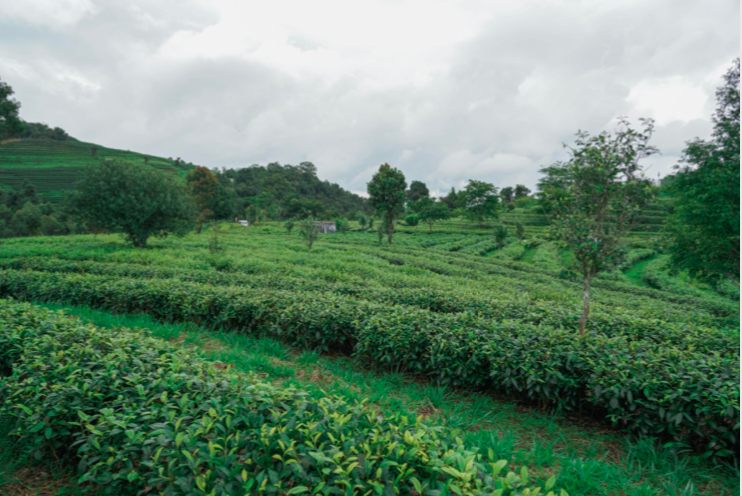
Sheng Pu'er vs. Shou Pu'er: Understanding the Difference
Share
Pu'er tea is one of China’s most celebrated and historic teas, renowned for its unique aging process and health benefits. Originating in Yunnan Province, Pu'er tea has captivated tea lovers worldwide with its rich flavors and cultural significance.
Within the Pu'er family, there are two main types: Sheng Pu'er (raw Pu'er) and Shou Pu'er (ripe Pu'er). Though they share the same origin, these teas differ in processing, flavor, and benefits. This guide explores these distinctions to help you find your perfect cup.
1. The Origins and History of Sheng and Shou Pu'er
Sheng Pu'er (Raw Pu'er):
Sheng Pu'er is the original Pu'er tea, dating back centuries. It was a prized trade item along the Ancient Tea Horse Road, cherished for its ability to improve with age during long journeys. Sheng Pu'er continues to be a favorite among collectors and connoisseurs for its evolving flavors over decades.
Shou Pu'er (Ripe Pu'er):
Before the 1970s, all Pu'er tea was Sheng Pu'er. However, as demand for aged Sheng Pu'er soared, particularly in Hong Kong and Southeast Asia, tea producers sought to accelerate the aging process. This led to the development of Wo Dui (wet piling) in the 1970s—a technique that mimics natural fermentation. Shou Pu'er was born, offering a smooth, mellow tea without decades of waiting.
2. Key Differences: Processing, Flavor, and More
| Aspect | Sheng Pu'er (Raw) | Shou Pu'er (Ripe) |
|---|---|---|
| Processing | Minimal processing; naturally ages over years | Wet piling accelerates fermentation |
| Appearance | Greenish-brown dry leaves; golden brew | Dark brown dry leaves; reddish-brown brew |
| Flavor | Bright, floral, fruity, slightly bitter | Smooth, earthy, mellow, slightly sweet |
| Health Benefits | High in polyphenols (antioxidants) | Rich in probiotics, gentle on the stomach |
| Best For | Tea enthusiasts, collectors | Beginners, digestive health focus |
3. The Science Behind the Teas
Sheng Pu'er:
- High in polyphenols, antioxidants that combat free radicals and support overall health.
- Its bright, slightly astringent flavor helps cleanse the palate and stimulate digestion.
- Best enjoyed by those seeking a detoxifying tea, but less suitable for people with sensitive stomachs.
Shou Pu'er:
- The Wo Dui (wet piling) process encourages probiotic growth, supporting gut health and digestion.
- Its smooth, earthy profile is easier on the stomach, making it a comforting choice for all tea lovers.
- Known for aiding metabolism and fat breakdown, making it a popular post-meal beverage.
4. Choosing the Right Pu'er for You
Sheng Pu'er (Raw Pu'er):
- Perfect for collectors and tea enthusiasts who enjoy dynamic, evolving flavors.
- Pairs well with light meals or desserts.
- Requires longer steeping and aging for optimal taste.
Shou Pu'er (Ripe Pu'er):
- Ideal for beginners and those seeking a mellow, comforting tea.
- Great for post-meal digestion or as a wellness tea for stomach health.
- Ready to enjoy immediately after production.
5. From the Heart of Yunnan: Our Pu'er Tea
Origins:
Our Pu'er tea comes directly from the organic tea gardens of Pu'er City, Yunnan, located at an altitude of 1,500 meters. This pristine environment, with its fresh air and fertile soil, provides the perfect conditions for cultivating exceptional tea.
Quality Assurance:
Certified organic by China, Europe, and the United States, our teas reflect the rich history and authentic taste of Yunnan’s tea culture. Whether you prefer Sheng or Shou, every sip connects you to the heart of Pu'er tea’s heritage.
6. Brewing Tips
- Sheng Pu'er: Use water at 85–90°C (185–194°F), steep for 20–30 seconds, and adjust steeping time based on taste.
- Shou Pu'er: Use water at 95–100°C (203–212°F), steep for 30–40 seconds for a rich, bold flavor.
Sheng Pu'er and Shou Pu'er offer two distinct journeys into the world of Pu'er tea. Whether you’re drawn to the dynamic evolution of raw Pu'er or the earthy comfort of ripe Pu'er, there’s a tea to suit every preference. Explore our selection of premium Pu'er teas and discover the authentic flavors of Yunnan.
